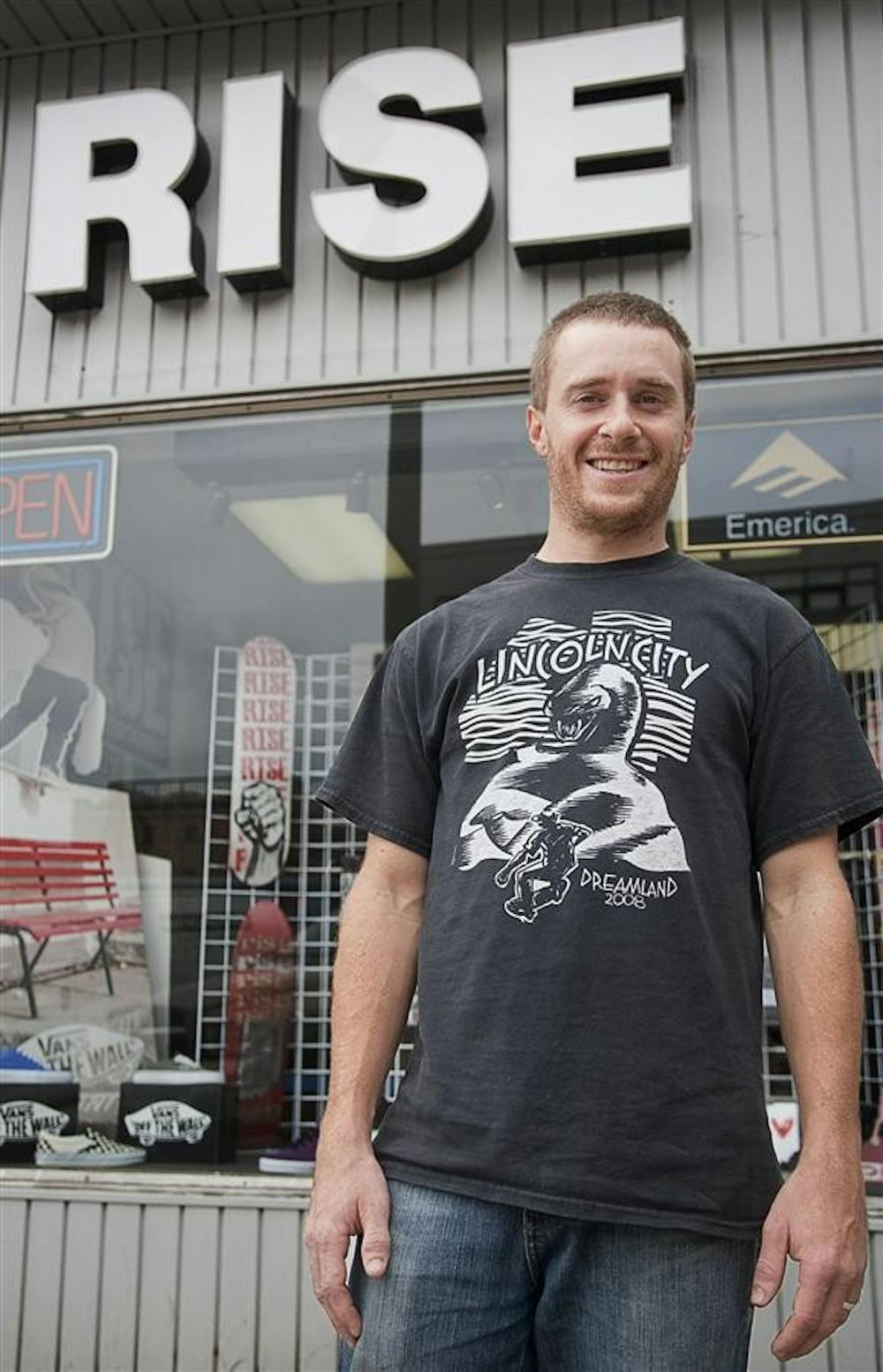Ryan Smith, owner of Rise Skateboard Shop in Bloomington has seen his skating world undergo rapid changes, going from a subversive underground culture typically affiliated with “rough kids” to a mainstream cash cow. And he said he’s not quite sure how he feels about it.
“Most people who would define themselves as core skateboarders are frustrated by how commercialized everything’s become, but then there are others on the other side of that who think it’s a good thing, that it’ll allow (the sport) to grow,” Smith said.
For Smith and his store, there is an effort to stay on the core side of the spectrum as much as possible.
Smith described “core” as an effort to stick as close to the grassroots of skateboarding by selling products made by skaters for skaters. Most of the lines he sells are made by privately owned companies, most of them regional.
But for a store owner, it’s impossible in today’s market to stay completely true to those core principles, and even core by its definition is changing as skateboarding becomes more and more socially accepted and demand for skate products increases, Smith said.
“Now there’s no such thing as looking like a skateboarder – everyone does,” Smith said. “Everybody’s skateboarding. Everybody’s wearing skate shoes and baggy pants.”
Skateboarding – which Smith said was still considered a subculture when he first started skating some 20 years ago, especially in Indiana – has since become a mainstream sport, with parents dropping off their kids at the local skate park and buying them the latest gear.
Fingers can be pointed at events such as the X-Games as culprits behind the commercial explosion of skateboarding, for better or for worse.
Since the X-Games began in 1995, Smith said skateboarding has only continued to increase in popularity. He said he has noticed a marked shift in public attitude toward the once-frowned upon activity, though he is quick to point out skateboarding on public property is still illegal in most cities, including Bloomington (see "It's the Law").
Growing up, the skate kids Smith knew weren’t exactly the all-American kids next door, he said.
“When I was growing up, all those kids were rough,” he said. “A lot of kids that get involved at first might have a fucked-up life, or they might not be athletic. Maybe they don’t want to be on the football team or can’t be on the football team. All you need to start skateboarding is some shoes and a board.”
It’s that accessibility that has no doubt contributed to the activity’s popularity, muddling the definition of what it means to be a skater.
Smith said that he’s seen skateboarding increase in popularity with the Bloomington college set as of late, citing transportation as the main reason he thinks IU students are buying skateboards. He said he’s seen an increase in sales of longboards, a type of board made for cruising as opposed to tricks, in the past year.
“In Bloomington, I feel like it’s either walk, bike or skateboard to get around,” he said. “Skateboarding is trendy right now. You’re going to look a lot cooler with a skateboard than a bike.”
Junior Maeve Miller uses her longboard to get just about everywhere.
“I’m too poor to have a car, and I have a lot of friends who longboard,” Miller says. “I like it because I can take it anywhere. It’s like walking, but faster-and more fun.”
The longboarding trend has not gone unnoticed by Miller, either, saying she’s seen several students on longboards around campus that don’t necessarily fit the skater-kid mold.
“I’ve definitely seen a lot of college kids on longboards lately,” she said.
One particular company toeing the line between authenticity and commerciality is Vans. Recognized by many as the first skate shoe company, founded in 1966, Vans has had much to do with promoting skateboarding as a lifestyle, with events like the Vans Triple Crown of Surfing and Vans Warped Tour. A publicly traded company since 1998, according to the company’s Web site, Vans has become a large commercial presence in the skate world.
But Smith can’t hate.
“As far as skating goes, they still do it right,” he said. “They make things you’re not going to find anywhere else but a skate shop.”
Skateboarding, Smith said, has in many cases become more about fashion than function, with an entire lifestyle and culture attached. But he said he believes at the end of the day it’s all about the thrill.
“It’s just fun being out there, hanging out with friends,” he said. “It’s just fun to go out there and take your board to the street. It’s a rush.”
And that is skateboarding at its core.
The Politics of Skateboarding

Get stories like this in your inbox
Subscribe





